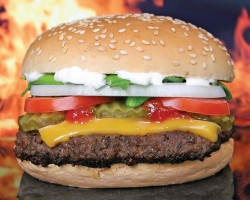Can Genetics Build a Real Kosher Cheeseburger?
Lander College of Arts and Sciences Professor Dr. Loike highlights what could be the next big trend in Kosher cooking

The “kosher foodie” movement is having a moment. Countless blogs, cookbooks and Instagram accounts are devoted to reinventing traditional Jewish foods for a new generation. Amateur and professional chefs are finding ways to use bold, new ingredients to reimagine and reformulate the foods of their youth. Could cloned, genetically modified meat be the next new exciting trend in kosher cooking?
Bioethicist Dr. John D. Loike of Touro College, Rabbi Moshe Tendler of Yeshiva University and Rabbi Dr. Ira Bedzow of Touro’s New York Medical College ask this very question in a recent article published in Hòakirah, the Flatbush Journal of Jewish Law and Thought.
Advances in biotechnology are opening the doors to new possibilities in food production and raising questions about the nature of pareve food. As “lab-to-table” food production becomes more of a reality, rabbis will need to make an assessment about the halachic nature of cloned meat. There is precedent in the industry as some clean meat companies are already working with rabbis and claim their cultured meat is both kosher and vegan-friendly. However, a keen understanding of both Torah law and biotechnology will be needed to determine kashruth.
Dr. Loike, Dr. Bedzow and Rabbi Tendler outline what they believe would make cloned beef universally accepted as kosher. Their three main considerations are:
- The sample must be obtained from a kosher animal.
- The animal must be properly slaughtered.
- Cloned beef could be considered pareve if the tissue from which the muscle stem cells are obtained comes from the skin.
Best estimations are that we are five to 10 years from actually seeing cloned meat and poultry in the supermarket. As has been done in the past, religious scholars will have to carefully assess the status of such products. If cloned meat is widely accepted as kosher and pareve, it could have major ramifications on the environment, our economy and, yes, our ability to eat kosher cheeseburgers.

